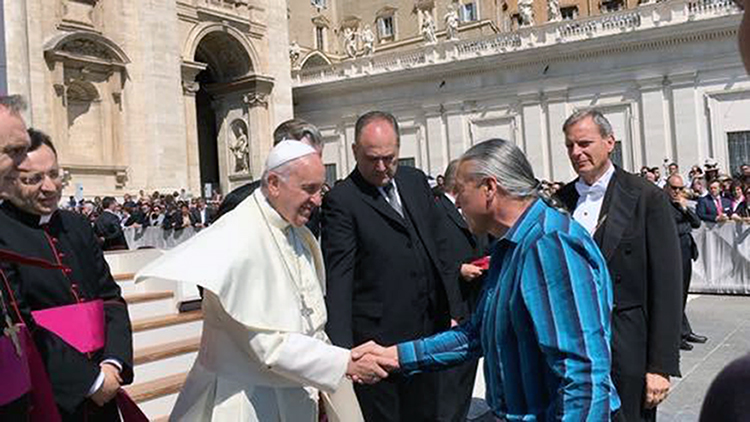Challenging Papal Doctrine of Discovery: Historic Next Step
Posted on July 1, 2016, by Libby Comeaux CoL

Photo by William Laronal Jr.
May 4 was the 523rd anniversary of Inter Caetera, one of several 15th century papal bulls that initiated the Doctrine of Christian Discovery. This doctrine justified colonial seizure “in perpetuity” of lands occupied by indigenous peoples and genocide if they did not convert. When the papacy’s civil authority ended, the doctrine migrated to civil law. It continues to serve as justification for denying indigenous treaty rights, as in the 2013 refusal to recognize indigenous sovereignty to purify Sacred Lake Onondaga after U.S. mining permits rendered it a Superfund site.
For almost 25 years, traditional indigenous elders and scholars have asked successive popes for an audience and to revoke these bulls. On this 523rd anniversary, 11 indigenous representatives who traveled to Italy for the “Long March to Rome” met, at long last, with a sitting pope.
Many religious organizations have urged the Vatican to repudiate the papal bulls. Their study of books like Lenape Steven Newcomb’s Pagans in the Promised Land has convinced them of the systemic racial, ethnic, interreligious, intercultural, economic and ecological injustices visited upon indigenous nations and peoples by these bulls.
When the 2016 Minneapolis Area Synod Assembly of the Evangelical Lutheran Church in America (ELCA) repudiated the doctrine, they acknowledged, “The unearned benefits this church has received from the evils of colonialism in the Americas,” and repented “of this church’s complicity in this doctrine.” In 2014, ELCA’s Rocky Mountain Synod commemorated the 150th anniversary of the Sand Creek Massacre by deeding land and buildings to the Four Winds American Indian Council.
The Leadership Council of Women Religious’s 2014 resolution, available here (https://lcwr.org/social-justice/Doctrine-discovery) ratified Loretto Community’s 2012 resolution, which calls us to “explore with the help of indigenous peoples what steps would be most realistic and useful for us to pursue.” The current request is for Loretto’s archival research on our sisters’ experience with the Indian Boarding Schools.
On May 4, each of the 11 representatives spoke directly with Pope Francis. When Newcomb greeted Francis, he prayed in Lenape, then said, “We’re calling on you to formally revoke that document so you can release the spirit of that negative energy that the Vatican placed on us.” Pope Francis said he would read Newcomb’s book, and Newcomb expressed his gratitude for the meeting.
Then the 11 representatives met for two hours with Archbishop Silvano Tomasi, chairman of the Pontifical Council for Justice and Peace. The Long March’s Joint Statement to the Council, presented at this meeting, concluded as follows:
“In our view the Holy See needs to put as much time, effort, energy and money into assisting with the restoration of our languages, cultures, lands and sacred places as it put into attempting to destroy and dispossess us from those features of our existence. … Furthermore, open the Vatican archives to our scholars; disclose and repatriate your holdings of any of our cultural and spiritual items and ancestral remains; support the [restoration of indigenous sacred sites]; support restoration and healing for our Nations.
“We look forward to further and fruitful discussions on this important matter, and propose … a series of international convenings with the Holy See, to discuss from our respective viewpoints, yours and ours, the significance of the papal bulls of the 15th century and the paradigm of domination and dehumanization. Furthermore, it is time for the Holy See to explicitly oppose the use of the Doctrine of Discovery and domination by state governments in their relations with Original Free Nations and Peoples.”
It was reported that Archbishop Tomasi agreed to further meetings and requested more information on the continuing impact of these bulls on indigenous peoples of the present day, with a view toward a possible new Vatican statement.
